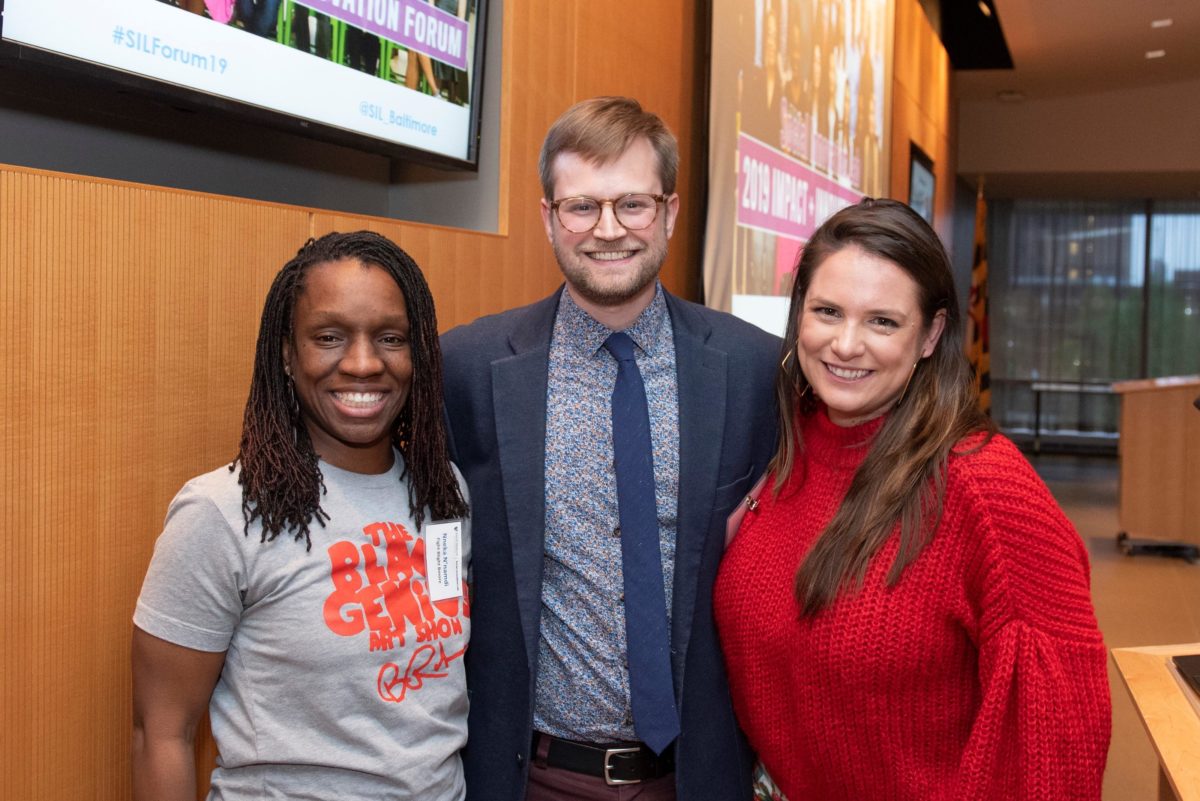Social enterprises are built to solve big challenges, whether they exist in the healthcare system, schools or neighborhoods.
Over six months, Johns Hopkins Social Innovation Lab (SIL) brought together ventures with founders from the university and wider Baltimore community who are applying new models to these issues.
On Tuesday, the latest cohort closed out as part of the Impact + Innovation Forum. It included the awards totaling $25,000 to a pair of ventures, picked by a peer vote and judges, with funding donated by the Abell Foundation.
Here’s a look at the 10 founders who gave talks on the night:
Happy Teacher Revolution: Winner of $15,000
Danna Thomas, a Baltimore teacher who received a master’s degree from Johns Hopkins, started the venture to focus on teacher mental health. It’s spread to 20 states and internationally as a network of teachers that’s designed to provide a support system in a profession that asks a lot. Happy Teacher Revolution looks to organize and conduct mental health and wellness support groups, through both online and in-person means.
Fight Blight Bmore: Winner of $10,000
Nneka N’namdi started with neighborhood organizing — and grew a campaign to address blight and create safe and healthy neighborhoods in a city that has more than 16,000 vacant properties. Now N’namdi is building an app to track and report blight, as well as provide a place to curate solutions.
Upon being announced as a winner, N’namdi said she wanted to put the funding to work with other SIL members to “stretch the dollars.”
Rose
Kavi Misrilall is looking to bring a new technology platform to mental health care. The platform uses AI to detect symptoms, and apply a targeted approach for therapy: “We are not replacing therapy but we are enabling and making the process a bit smarter,” he said.
Health 3D
Johns Hopkins students Chris Shallal, Kirby Leo and Jody Mou started a venture to create 3D-printed education equipment for children in hospitals. The customized equipment is designed to support child life specialists as they educate patients. One example is a halo brace outfitted for a doll, which allows children to better understand the purpose of the treatment.
Be.Virtual
Tonee Lawson, founder of The Be. Org, created a virtual reality experience built by youth that’s designed for social-emotional learning. Coding and development work is completed by youth, through a partnership with Code in the Schools. The VR, in turn, is designed to provide content or youth on responsible decision making and social awareness that can be integrated into the school day.
MOMCares
Ana Rodney is providing holistic support to mothers in the newborn intensive care unit, which provides care to babies who were prematurely or are sick. MOMCares provides postpartum doula support to African American mothers who are navigating this experience with their child, offering a 42-day timeline of intensive services.
Roots & Raíces
Valeria Fuentes created the social enterprise that’s designed to bring immigrant artists and musicians together to create change. Fuentes looks to bridge art and advocacy by offering a market, event production and education. The team also includes Abbey Parrish, Torianne Schiff, C Kim, Luz Orozco, Eean Logan, Ariel Foster and Adrianna Fuentes.

Baltimore Farm to Clinic Project
Working in the area of East Baltimore Medical Center, this initiative is looking to bring healthy foods and nutrition education to an area with limited food access. They’re adopting a cohort model that will provide fresh food as well as classes on cooking and other topics, along with monitoring patient outcomes.. The team includes Bailey Miles, Kate Rediger, Jon Shaw, Laura Harding-Fukushima, Joann Williams and Brian Adams.
Baltimore Job Hunter Support Group
Janet Glover-Kerkvliet started an initiative to provide support to a group that can be isolated: older workers who lost a job in the middle of the career, and are experiencing long-term unemployment. The group provides counseling, and coaching, as well as referral services and advocacy.
Ars Medica
Javier de la Maza pitched a new kind of space for doctors and medical students to share stories, ultimately creating more empathy between clinicians and patients, as well as addressing burnout in the medical profession. The founding team also includes Marielle Bugayong, Taj Keshav and Jianyi Nie.







